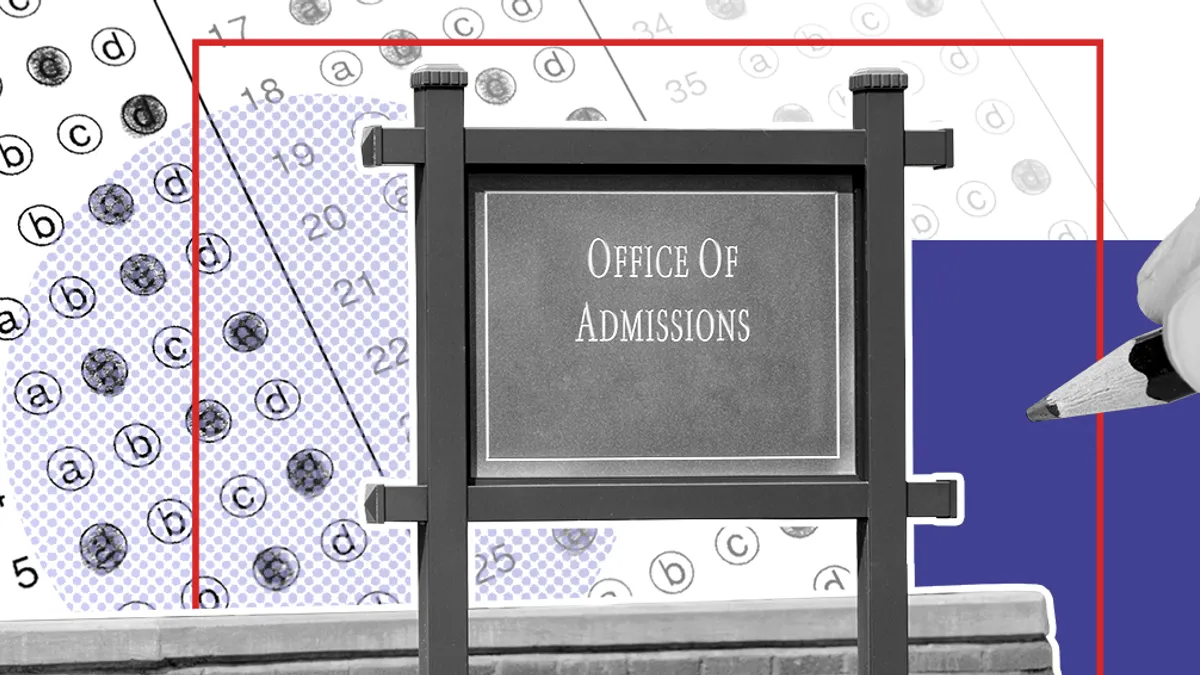This story is part of a series about changes in how colleges use admissions tests. Find the rest here.
The coronavirus upended a key element of the college admissions process in a matter of months, shutting down K-12 schools and other sites traditionally used to host students taking the SAT and ACT.
Limited access to testing centers prompted many colleges to scale back their requirements that students submit admissions scores, swiftly advancing the campaign to move American higher education to test-optional policies, including — albeit temporarily — the entire Ivy League.
Much rarer are colleges that refuse to consider the tests at all. However, in response to the pandemic, several more have announced they will do so for the fall 2021 admissions cycle, most notably the California State University System and the California Institute of Technology, one of the most prestigious STEM schools in the country.
Testing critics' chief complaints are that the exams are racially biased and benefit wealthy students who can afford ample and expensive tutoring. Removing testing requirements altogether — referred to as going test-blind — would correct inequities faced by Black and Latino students even more than would making them optional, some argue.
But even with the disruptions spurred by the health crisis, most colleges won't do away with the tests outright, admissions professionals say. Some institutions have only begun to experiment with test-optional policies and haven't collected data proving they can vet applicants without scores. Others rely on the tests to determine merit-based scholarships.
Removing a testing mandate may alleviate anxiety for those low-income or first-generation students who might not otherwise apply to schools that require them, admissions professionals and other test experts say. But as long as the avenue exists for students to submit their scores, they note, many will do so to give themselves a competitive edge, assuring the tests will have a place in admissions.
"I hope that test-blind becomes more central to the conversation," said Jay Rosner, executive director of the Princeton Review Foundation, which helps underrepresented students prepare for standardized exams. But even then, he added, test scores are sometimes required for scholarships. "That's a dissonance that doesn't play well over time."
Rankings pressure could lift
The practice of making test scores optional started with Bowdoin College in 1969, but schools did not stop requiring them altogether until the early 2000s. Sarah Lawrence College went test-blind in 2005 but scaled its policy back to test-optional in 2012. The former president of the New York liberal arts school lamented several years prior that without the scores, U.S. News & World Report would intentionally skew the college's ranking, which played into its decision to once again review them.
Hampshire College put test-blind back on the map in 2014, adopting the policy despite U.S. News' refusal to rank the school.
One reason colleges are reluctant to go test-blind is because they don't want to be relegated to the publication's "unranked" category, said Fumio Sugihara, Hampshire's new dean of admissions and financial aid. The U.S. News standings, though infamously easy to game, have long served as the public's metric for judging the quality of a college.
"The pressures bearing down on us — from a revenue perspective — are incredible," Sugihara said, noting that some colleges would not want to lose their place in the rankings during a period of economic turbulence.
That fear could soon be alleviated. The publication announced recently it would start to rate test-blind institutions, citing the pandemic's potentially long-standing effect on admissions tests. Test scores accounted for 7.75% of universities' ranking in the formula used to tabulate last year's list.
Getting rid of the tests has not disadvantaged Hampshire, despite enrollment woes that have plagued it and some of its peer institutions, Sugihara said. In fact, the small liberal arts college saw a small spike in its enrollment yield when it went test-blind, he said.
The data to prove it
While the shift matched Hampshire's mission to consider students holistically, Sugihara said, he isn't sure how that process could be translated to a larger institution that fields tens of thousands of applications a year.
The University of California System's decision to stop reviewing SAT and ACT scores starting in 2023 will likely serve as a model for large colleges looking to forgo admissions tests entirely.
But colleges won't completely drop the requirement until they have information showing whether making the tests optional positively affected enrollment, Sugihara said.
Such is the case at the University of New England, which will pilot a test-blind process for the fall of 2021 after trying out a test-optional policy. When the college went test-optional for students entering in the fall of 2019, it saw the largest freshman class in its history, with 721 new first-year students, a 13% increase over the previous year, said Scott Steinberg, its vice president of admissions. It was also the most racially and ethnically diverse new undergraduate class, with 109 new students of color, a 25% boost over the previous year.
The university's success with test-optional spurred the move to test-blind, Steinberg said. But it's not always an easy sell to high-ranking administrators, as the tests have become ingrained in academia and are something of a rite of passage for students. Admissions professionals often have to convince their colleagues that such policies have merit, he said, and "be armed with data" to prove it.
"The internal friction comes with people not being fully aware of what the SAT and ACT can predict and what they can't," Steinberg said. "Part of it is just precedent."
Catholic University of America, in Washington, D.C., was another to recently announce a test-blind strategy in part because of the strain of the coronavirus on students and families, said Christopher Lydon, vice president for enrollment management and marketing.
The university was test-optional for several years, Lydon said, adding that it wouldn't have been able to completely stop reviewing tests without having the data to back up the decision.
A test-blind policy will help needy students even more than a test-optional scenario, Lydon said.
"Being able to articulate to a first-gen student, non-native-English-speaking student or even a poor test-taker, assuring them their application would get full consideration, was an anxiety reducer," Lydon said.
Yet some feel colleges shouldn't shun the tests completely.
Jed Applerouth, president and founder of Applerouth Tutoring, an online test-prep company, believes test-blind schools will remain a minority across higher ed. He acknowledged the benefits for some colleges, such as a bigger and more diverse applicant pool.
But students' high school GPA, an alternative to the scores, isn't necessarily an objective measure of their talents, given disparities in how teachers grade, Applerouth argues, adding that he "takes comfort" in a standardized measure.
"There's value for some students," he added, noting that colleges also benefit from the data testing providers collect. "Why limit yourself?"



















